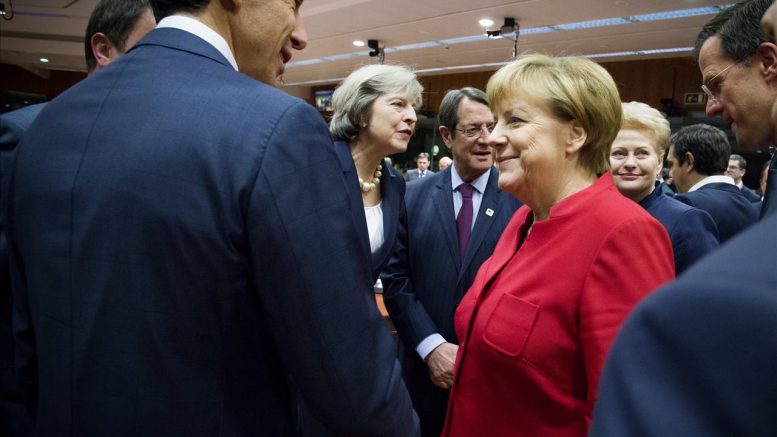German Chancellor Angela Merkel must have mixed feelings about the British Brexit vote. Despite all that is bad about it from her point of view, the one thing for which she must be feeling at least a tinge thankful is that she is now sharing with Theresa May the burden of being a crisis leader.
There has been much discussion about what the German Chancellor and the British Prime Minister might have in common. But the fact that, since the Brexit vote, the heat of political controversy that Merkel has been under for the past year has at least partly been deflected to the UK’s Brexit Prime Minister. And that must be a relief for Merkel.
For one thing, with the shift of attention from Merkel and the European migrant crisis to May and Brexit, Merkel has been given some breathing space to reflect on the situation in which she finds herself, and in which Europe finds itself – a luxury which political leaders under pressure desperately crave but rarely get.
Reflection time is something that May must have hoped she would get between the time of her declaration in early October of her intention to trigger Article 50 and next March when she intended to pull the trigger.
But, that hope has been dashed.
The dramatic ruling by the High Court last week that Parliament must vote on Brexit greatly complicates the issue for May, who now faces an even more complex set of problems to be resolved in trying to find Britain’s pathway out of the European Union (EU).
Even if – as seems unlikely – the Supreme Court overturns the High Court ruling, the extra uncertainty and confusion surrounding Brexit as May wrestles with her divided party is a huge problem for her and the government.
In the now likely event that the government has to get an Act of Parliament to authorise Britain’s exit from the EU, the problems of how to define the terms of withdrawal will be compounded and the difficulty of achieving a March 2017 timetable will become all the greater.
In these circumstances May will seriously test the patience of her already deeply unhappy negotiating partners in the EU. The temptation in Europe to let her and the government stew in the problems of the UK’s own making will be great. This is where an apparently strengthening mutual respect between Merkel and May will be important.
Merkel is the most pragmatic and reasonable leader in the EU. It’s not only because Germany is Europe’s biggest power that she has emerged as the “leader of Europe”. It is her character and her openness to consider all issues on their merits that has put her where she is.
Europe has nothing to gain from a bitter and bloody break with Britain. The High Court decision reinforces this argument. A “soft Brexit” is now more likely.
The German Council of Economic Experts (the so-called “wise men”) has urged Merkel to approach Brexit negotiations “with an open mind” on concessions the UK might demand.
Almost certainly, Merkel did not need to be told this.
Merkel has had her own recent experience of having to deal with a political crisis not of her own making – the ugly reaction to the refugee crisis and to her handling of it.
Merkel has given every indication of having sympathy for May’s situation. They appear to share similar political chemistry, in significant part because of their similar political journeys from humble beginnings to the leadership of their country’s respective conservative parties.
This would not have been the case if May were a Margaret Thatcher-style British leader – a hardline ideological and divisive prime minister.
Merkel has always sought to be a unifying leader, not just because Germany’s history and its system of grand coalitions compels it, but because that is who she is.
Rarely has Britain needed a unifier at the helm of the nation more than it does in the Brexit years and May could not find a better model than Merkel.
Merkel is also sensitive to the historical tensions still present in Britain’s relationship with Europe and especially Germany. She will want Germany to be seen as both respecting the rule of law in Britain, and being a fair and reasonable influence on the Brexit negotiating process.
The explosive reaction by Brexiters to the High Court decision shows how deep feelings are running. A provocative reaction to the anti-European mood in the UK would poison the negotiating process between May and her team and the EU representatives.
The election timetable in Europe next year won’t help maintain a reasonable environment in which the Brexit negotiations will take place. Merkel faces her own election in Germany in late 2017.
When calmness, sensitivity, patience and firmness are such vital qualities in relations between London and the European capitals, Theresa May would surely be reassured by Merkel’s role as the senior leader of continental Europe – and hope she continues in it throughout the Brexit process.
Britain may think it doesn’t need Europe. But Theresa May must surely know that she needs Angela Merkel.
By Geoff Kitney





